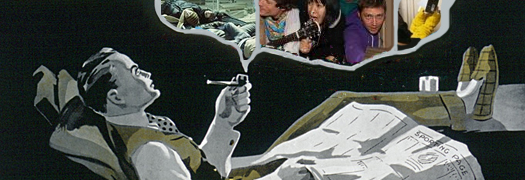
Features | Lists
By The Staff
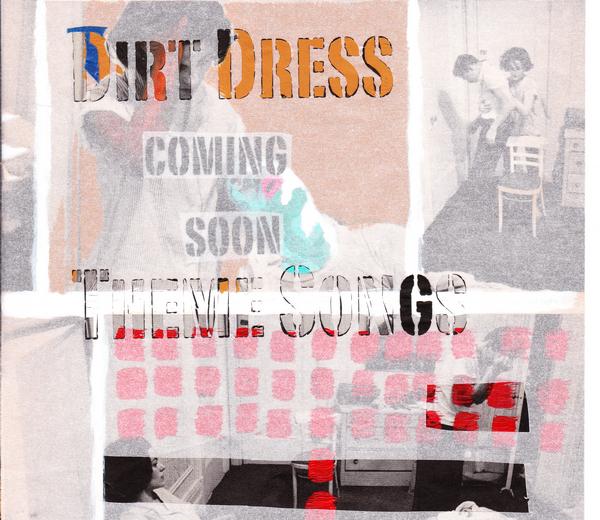
30 :: Dirt Dress
Theme Songs EP
(Self-released)
Interactions between irony, global warming, distorted rock guitar and independence are often complex, and often fatal. I estimate that our hypercritical sphere, caused in part by inexhaustible shit, contributes to >200,000 blog-deaths, countless pet-peeves, and perhaps a rise (temporary) in the number of people getting laid in the under-18 and self-consciously Important age bracket.
Dirt Dress has a unique plan for these issues. This their very cool, totally non-shit EP plays as a series of teddy punches; songs that rock, but rock with a series of micro-changes that culture an increased sensitivity, rather than attempt to desensitise our need to rationalise things into a series of statements about ourselves. Their underlying rhythm is like a bedrock of dependable moxy. The vocals and everything else are nuisanced, as they should be. This is not the new pulverising non-pancreatic big-sound thing. I feel no need to take a drug history: the band’s tight, the songs are fun and the play and banter is fully-earned. “Peter and the Wolf” being the jam: twelve minutes of casual almost-dexterity that approaches the best the Velvets had to offer.
All this, however, may be trumped by the arrival of a sizzle-hot and phased guitar solo, which will change everything. This happens a couple of hundred times across the EP, and I’m grateful for it, always.
Alan Baban
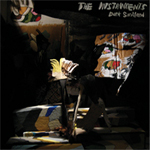
29 :: The Instruments
Dark Småland
(Orange Twin)
Sitting low and stately in some slate gray 19th century foreign harbor is a wooden merchant’s vessel of ancient construction, rocking arthritically in the frozen, persistent wind whipping in from off of the water. And every night, after the fog-addled sunset bathes the docks in lusty tropical shades of orange and magenta, after the gray creeps back and inches, over the hours, into charcoal, after all the hatches are battened and the rough hewn decks swabbed, a small collection of the crew gathers in the swollen, groaning belly of the ship and fashions—by the light of a few oil lamps—the music on the Instruments’ third album, Dark Småland, out of the sagging musty clump of their shared exhaustion and mourning. They imbue it with the steady rhythms of the waves and the hardiness of the sea-salted breezes and the ache of transience. And every night painfully reclusive first mate Mangum darkens the doorway despite himself and listens, nods approvingly, then joins in briefly with a melody or harmony so sweet and disturbing that it takes the others a beat or two to envelop it into their communal hum. They’re little more than gypsies. Seafarers. The music isn’t art, though it’s lush and evocative. It’s an incident of life, a cave painting, an outgrowth of hard won experience. It’s organic, as simple and necessary as an exhale.
Eric Sams
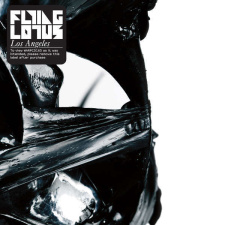
28 :: Flying Lotus
Los Angeles
(Warp)
I’ve never been to L.A. and never feel the need to: I envision its murky traffic sprawl, its ghastly architecture, its Lauren Conrad. I’m cool on that.
But my embargo on me will change when FlyLo’s Los Angeles comes to fruition. In that post-apocalyptic playground I will be at home; I will ride a big bike and have a pill on my jacket. The most stunning thing about Los Angeles is that it stuns, abolishing the almost classicist (for hip-hop) minimalism of 1983 in favor of swooning laptop biotechnology, drums pumping oily blood through CG hearts and Technicolor flourishes of ethereal robot choirs. One imagines Sephiroth twirling a blade. One imagines great plumes of fire reflected in Harrison Ford’s instructive eye. One imagines awesome.
Most writers dwell on the post-Prefuse plushness of FlyLo’s percussion here, and while the comparison is apt it negates one of Los Angeles‘s most enduring and endearing qualities: Prefuse never made bangers like this. “GNG BNG,” all idiotic hyper-compressed Justice bass line and boom-bap ridiculousness, is the proper soundtrack of a yet-unproduced Kevin Durant Nike commercial. Stoned as shit, “RobertaFlack,” meanwhile, is the proper soundtrack of getting stoned as shit, hi-hats sibilant, drums clapping on your cerebellum. Los Angeles is instrumental hip-hop like they never really made it: thriving in the absence of vocals, rich like Egyptian silk dipped in chocolate, confusing as that metaphor but delicious, but heady. But more than DJ Shadow, this ought to make Squarepusher quake. Here, after all, is IDM that holds all three letters in equal esteem.
Clayton Purdom

27 :: Fleet Foxes
Fleet Foxes
(Sub Pop)
It feels selfish approaching Fleet Foxes’ debut alone. It has a universality that has made it an obvious end-of-year favorite. They also have a perfect blend of voices that recall church song and fire-side singing that gives me a warm fuzzy gut-feeling rather than any cerebral process I can spell out. Of course, there are things I can list that I love about the album. The lush harmonies, the soulful major-minor switches in songs like the “Blue Ridge Mountains,” Pecknold’s instantly agreeable voice which flits between Paul Young and Art Garfunkel and the grandeur of songs like “Quiet Houses,” but I can’t say, here and now, why my appreciation is more than a technical admiration of their songwriting or arrangements.
Ideally, I should recreate the communal spirit this album portrays through a fireside critique by flying out m’colleagues to the UK, set up camp somewhere in our fair green countryside and discussing the merits of the Fleet Foxes’ timeless sound under a canopy of stars and a heady beer buzz. But I’m a bit of a tightwad so that idea went out the window. In the end, like Michel Eyquem de Montaigne, I quote others only in order to better express myself. And bless David M. Goldstein for being able to distill my thoughts into something more concise that I ever could:
“They’re the rarest of entities these days. Talented songwriters who also happen to be good musicians who can sing their asses off. No gimmicks. Just a good, honest classic rock record.”
Yeah. That.
Danny Roca
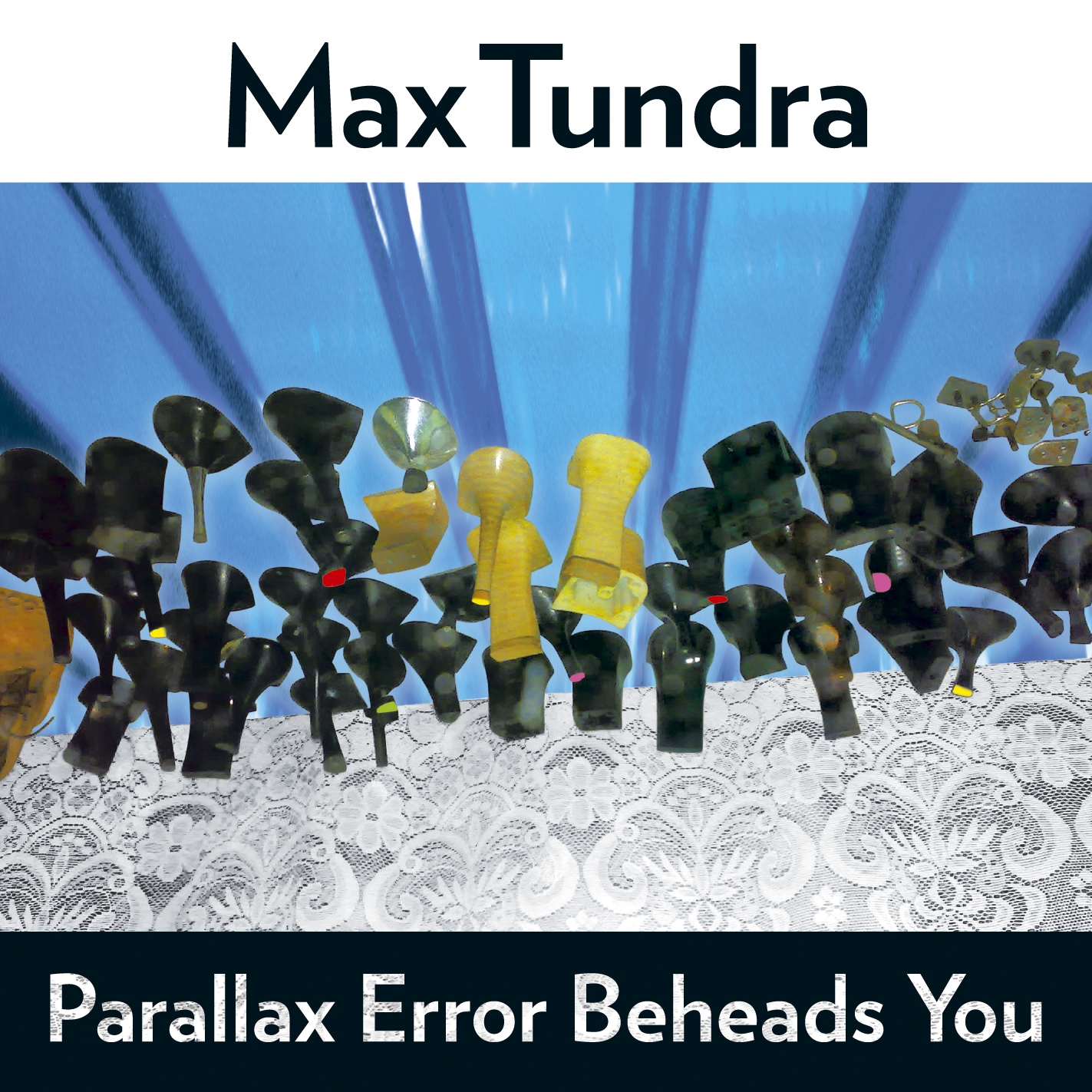
26 :: Max Tundra
Parallax Error Beheads You
(Domino)
I like to imagine Ben Jacobs writing this album from the loins of his pain, really carping that shit out but making it ultrasonic and really catchy too. Because Parallax Error Beheads You is allsorts of chewed up, like this tick-borne impulse he had’s gone global—sick of plain sound exchange, he now sorts teeming and restless democracies at play, taking his own baby-photo and speculating a hundred million different ways that kid could have gone at once, if he liked fashion and listened to Steely Dan. So, brazenly accessible and high-on-loops, kid detonates on a sugar-rush of unsousable love, gets spurned then pulls this, the break-up-album-as-party-trick.
Little of it can be danced to, and that which can comes up beat and sort of depressing. Its din is uncluttered and accented. One hears melodic hyperspace forced open between knotted filigrees of obsessive tinkering. Every bit seems considered with earshot in mind. Like the bit in “Which Song” where a synth sports flaccid and spastic like so-many party hats, before overspilling into progressive frames of reference, each more involuted and brilliant than the last. The sum effect is broad-spectrum loneliness; it ends (of course) as a pop song should: with tonk-ass splurges of melody, pure Rivers Cuomo land, petroleum jelly for the soul.
So, the best profile pic ever, if it were one. Instead it’s a bittersweet and feloniously-inventive melodic piece, full of false-charges and forward-runs, an every-which-way-is-up invective that’s by-turns wimpy, wussed-out and sexy droll. This is a record built out of a close-to-suffocating need for fun and it overreaches, dramatically. Concordance means order means feet-in-place, bitch! This guy and Elvis Costello could be Facebook friends.
Alan Baban
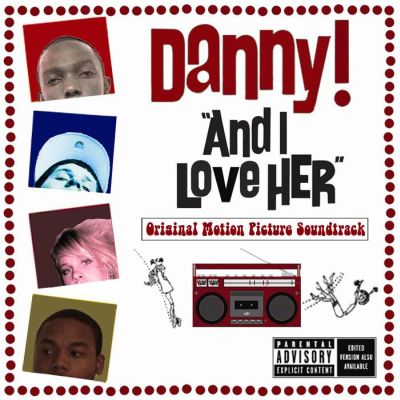
25 :: Danny!
And I Love H.E.R.: Original Motion Picture Soundtrack
(1911)
In the vast galactic space that is CMG’s hip-hop loyalties and fetishes, there are a few of us still bobbing in the isolation of the shuttle. The braggadocio with which hip-hop artists describe themselves may not be full-out alienating, but it’s something other to behold. For those of us weaned on the tender keening of singer-songwriters who self-portray in primary colors and turn their fingers 180 degrees, to hear someone describe themselves as the second coming of Christ is cause for a nervous laugh and appreciation by way of calculated justification. I tried to get next to Clipse’s Hell Hath No Fury and, seamless as it is, I still can’t help but feel exactly like the outsider it makes me out to be. It’s not supposed to be for Conrad Amenta, civil servant from Ottawa. If it was, it would have more songs about property taxes.
So maybe it’s a kindred spirit I hear when Danny Swain is so self-deprecating; this year may have produced an incredible production tribute in Black Milk’s Tronic, which dropped samples so immediate and beats so raw you could literally see a beast in the room, and a political terror in Invincible’s Shapeshifters that is that true rarity of nigh-Importance. But it was And I Love H.E.R. that seemed to coalesce like a gathering as naturally funny and appealing as the man himself.
And part of it must be self-awareness other than hip-hop as sociological mindfuck, a rap album about one rapper rather than that one rapper in the context of rap itself. Being a star in the fame constellation and seeing the Kanye supernova in his peripheral vision, Swain sidestepped the game of ever-escalating hyperbole and made a very human album about fucking up, badly; having one’s heart broken; being a music fan, a hip-hop fan, a producer; taking another Charlie Brown-run at Lucy’s football. What Kanye did this year with 808s and Heartbreak had all the spontaneity and naturalness of Jay-Z coming out of retirement; for Danny! this life isn’t episodic chapters on a fated drive to singular significance. His hip-hop life just is.
Conrad Amenta

24 :: WHY?
Alopecia
(anticon)
I spent much of 2008 being carted about in Megabuses from Chicago to Ohio. These buses, renowned for their affordability and lax attitude toward such notions as “customer service” or “time,” are clean but cramped and subject to the erratic whims of their drivers. Yesterday, he regaled us with his bootleg DVD collection. (The new Will Smith movie is pretty bad.) In lieu of partaking in these communalized entertainments I treat the six hours as an opportunity for some deep listening, and in 100% of these marathon stretches I’ve listened to Alopecia. It is, then, for me, the sound of rain-streaked windows and flaskdrunk insomnia and the narrative of an interminable middle place between the pretty and sweet-natured girl waiting to pick me up in Columbus and the city I’d assholishly and unilaterally uprooted to. The venality of Yoni Wolf’s vision—full of prurient details like the “slight jingle of pocket change” accompanying back-alley sodomy—evokes for me only and specifically the curdled post-industrial stench of Gary and the slate-grey torpor of Toledo. It also all sounds great on headphones, which helps, tempering solid boom-bap with coruscating melodies and million-instrument lushness. And at its core is “Fatalist Palmistry,” a song so individually great its presence alone demands Alopecia‘s inclusion today. Those of us that love Alopecia tend to love Alopecia and really love “Fatalist Palmistry,” evoking as it does at once mid-‘90s radio rock and the way your first real girlfriend’s hair smelled. Even rap nerds gotta pine sometimes.
Clayton Purdom
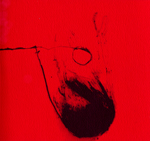
23 :: Kingdom Shore
...and all the dogs to shark
(Black Bough)
I like to listen to this album and imagine that it’s the Four Horsemen of the Apocalypse arguing about about something trivial. For example:
War: Don’t send Famine to get the groceries again! I need some fresh vegetables to keep my face-smashing arm strong!
Famine: It’s not my fault…
Pestilence: I just want some sinus medication.
Death: Oh for fuck’s sake—shut up about your sinuses!
War: Yeah…or I’ll smash you in the face!
Death: Yeah! Anyway….I’ll get the groceries. What kind of beer do we want?
Famine: Some kind of stout.
Pestilence: Stout? Famine wants something stout?
War: Snerk.
Famine: Well…what kind of beer do you want? Vomit Ale? Ha! Am I right?
[Blank Stares]
Famine: Am I…? Come on, guys…
Death: Uh huh. Good one, Fam. Moron. So…Count Chocola for cereal, right?
…except, imagine that conversation being had by four violins in the process of scalping you. Sweet.
Mark Abraham
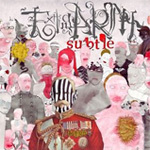
22 :: Subtle
ExitingARM
(Lex)
Year-end time is a tense one in the CMG Septagon. The older staff feels themselves growing older, distant, out of touch with contemporary trends in rock music and its audience. The younger staff feels that same alienation and aging too but they come in with grand acerbic pronouncements about the noxiousness of the culture they find themselves chronicling, fixing a change in the weather and none for the better let them tell you. Us senior staff listen patiently, deep in our second highball of the morning when Scott walks in the room, takes his chair, and hands a scrip of paper to Chet. Chet, reading, grumbles something about how high a certain American placed TV on the Radio on his list (I start to eat the olives in my Martini), and then all hell breaks loose: blurbs are assigned, a deadline is given, and for two weeks you can hear a pin drop in the halls. Heads poke out of cubicles, looking each way before sprinting for the bathroom. Suddenly everyone’s other job demands 64 hours every week. Anyone found on the internet pleads the need to do totally dry, esoteric, academic research, or else is assiduously surfing Monster.com (thinking, as one scrolls down the frequently-visited-address window, that monster is spelt with three x’s, right?).
I mention all of this because following Joel’s lead on ExitingARM leaves me a bit sore, plus I feel foolish trying to condense this wild, entirely ungainly, and fiercely brilliant album in two graphs. (HOMER’S BRAIN: Then why did you kill the first graph on the CMG Septagon?) (HOMER: Quiet, you!) I mean, the album was too big for its own website, which is, like, space. Ideas are at every turn: take “Day Dangerous,” a song in which its titular word (dangerous) is used as a hook. The word repeats and in each repetition you can hear it disintegrate under a phalanx of computer effects. And the whole thing feels like a joke, maybe, because isn’t the whole idea that Hour Hero Yes (the protagonist Subtle’s lyricst Dose One uses in this and the prior two installments of an Odyssean trilogy) is trapped and forced into writing harmless pop songs (which use a lot of repetition, so okay: “dangerous” “dangerous” “dangerous,” I get it)? But he tries to use his misfortune for good, tries to put something subversive into the mainstream (something “dangerous,” the title of a Michael Jackson album, not coincidentally) to perhaps make it more potent. But as the word/idea repeats it’s the potent idea itself that actually gets corroded, while the mainstream gurgles on. You can hear that water bubble and flow, by the way, because over and under all of this is a shoegaze guitar and trip-hop drum that sounds like Yes is already submerged, trying to dig a tunnel if not to escape, than to find someplace to bury a secret. For the writer (and the fan) this is a demand to cancel appointments, hunker down with some saltines, and flex the brain something serious. For Subtle, this is track two. So thank God that the album turns out to be just complete fucking ear candy. As erudite and imposing as this record is, it’s never a chore. It doesn’t waste one syllable. In its mockery of pop formulae and conventions, ExitingARM proves to be a concise, memorable, and daring record that can be loved without the lyric sheet. Or the board game.
Christopher Alexander
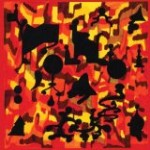
21 :: Dan Friel
Ghost Town
(Important)
On January 17th, 2017—three days before the end of his presidency—Barack Obama’s adamantine fingers will crack open Satan’s ribs and plunge into the black hole where his heart should be, collapsing the essence of evil and founding the intergalactic golden age that lasts until the end of time.
The truly bipartisan culmination of hope and change, however, has already arrived: Dan Friel made a pop record entirely out of squeely noises n’ shit. No longer, friends, must pop and art gather on opposite ends of the aisle, those who like music made of songs sneering at those who just like static, blippy sounds, and ideas. No longer must we suffer charlatans like Panda Bear who shout compromise from the rooftops while offering some gussied up version of one ideology or the other. No longer must we endure our divided selves in a divided land.
Who but Friel had the experience to hit the ground running on day one? He and his Parts and Labor bandmates proved with last year’s Mapmaker that they could make industriometalcore that worships Satan gently, like Slayer covering “Build Me Up Buttercup.” Friel brings this genre-collapsing genius to an EP that inheres in three main components: robobeats, fuzzy stuff, and soaring electro melodies. It sings sturdy joy (“Ghost Town Pt. 1”), pogos on a night out (“Buzzards”), contemplates the beyond (“Horse Heaven”), and, sometimes, sounds like a Prius facing its own mortality (“Singing Sand”). It is a many-splendored thing: the noise record your mom can get with; the tenderest fuck-you ever to frolic in a sunny clover field; the most listenable post-rock record of the year.





